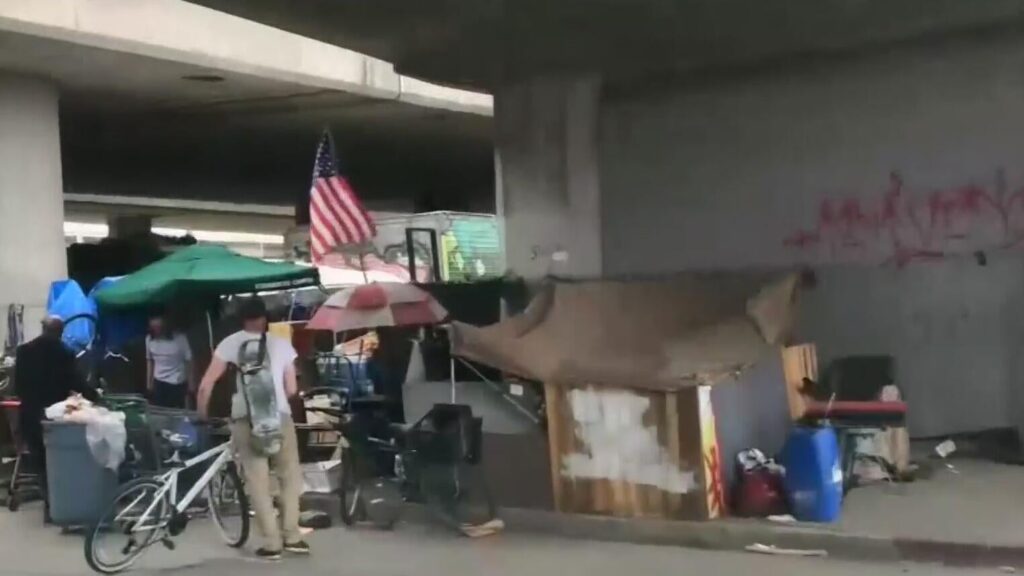Concerns Arise Over Trump’s Executive Order on Homelessness and Mental Health
President Trump’s recent executive order aimed at tackling homelessness has drawn criticism from mental health advocates in the Bay Area. The order identifies mental illness as a significant contributing factor to homelessness and advocates for the forced commitment of individuals, a strategy proponents argue could provide necessary care. However, groups such as Families Advocating for the Seriously Mentally Ill (FASMI) express serious reservations about the humanity of this approach.
Advocates Raise Their Voices
FASMI is a collective dedicated to supporting the rights and treatment of those struggling with severe mental health issues. With a history of activism against inadequate mental health support systems, particularly within the criminal justice system, members have been vocal about the lack of proper treatment options in facilities like Santa Rita Jail in Alameda County. Margot Dashiell, a member of FASMI, highlights the complexity of mental illness, expressing concern that the President’s approach is overly simplistic. “If you haven’t lived with it, you don’t understand the complexity of serious mental illness,” she states, adding a personal touch about her sister who is currently homeless.
Although the executive order suggests an intention to transition homeless individuals into long-term care facilities for “humane treatment,” Dashiell argues that this may instead lead to punitive measures. “At first glance, it seems humane; however, a closer look reveals a penalizing approach rather than one that encourages genuine treatment,” she asserts.
The Fear of Criminalization
The founders of FASMI, who all share experiences of having loved ones with serious mental illnesses, convened recently in Berkeley to dissect the implications of the President’s order. They have sanctioned the notion of enforcing treatment under certain circumstances but are wary that the executive order’s straightforward language may result in mishandling of the mentally ill—similar to how undocumented immigrants are managed through makeshift camps, devoid of real care. Katie Polony, another FASMI member, expresses the fear of criminalizing mental health issues, stating, “We don’t need an administration that is callous towards the vulnerable to force our kids into inadequate facilities.”
The Criminalization of Mental Health
The executive order defaults to viewing homelessness and mental illness through a law enforcement lens, tasking the Attorney General with enhancing civil commitment procedures for individuals deemed dangerous. This aspect is troubling for individuals like Alison Monroe, whose adoptive daughter lost her life to a fentanyl overdose while experiencing homelessness. Monroe worries about the potential classification of her daughter as a criminal and the implications that might have on her treatment and care.
“If they defined her as an offender, they might have placed her in jail indefinitely, with no communication or oversight from me,” Monroe explained, emphasizing her apprehension about the order’s implications for vulnerable individuals.
A Troubling History
The government’s historical involvement with mental health has been fraught with challenges. For decades, individuals with severe mental illnesses were confined in asylums known colloquially as “snake pits.” Although reforms began in the 1960s to prioritize community care, the promised systems have often failed to materialize—leaving many without adequate support.
Patricia Fontana, a FASMI founder, notes the cyclical nature of treatment, expressing concern that the President’s order may push society back toward neglect rather than forward toward effective community-based solutions. “This is akin to a pendulum swinging between extremes. It swung toward neglect, and now we fear a regression back to earlier, darker times,” she concludes.
Table: Impact of Trump’s Executive Order on Mental Health Care
| Concern | Implication |
|---|---|
| Forced Commitment | Potential for penalization rather than treatment |
| Viewing Mental Illness as Criminal | Increased stigma and lack of support |
| Lack of Community-Based Care | Diverting individuals to inadequate facilities |
As the conversation around mental health and homelessness evolves, concerns remain regarding the human impact of policy decisions like President Trump’s executive order. As advocates seek a collaborative approach that emphasizes treatment and support, the future for those affected by serious mental illness remains uncertain.

